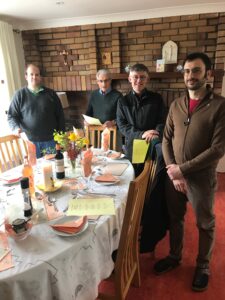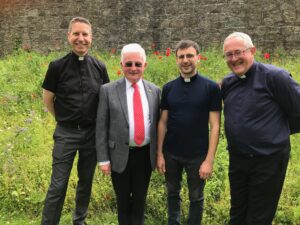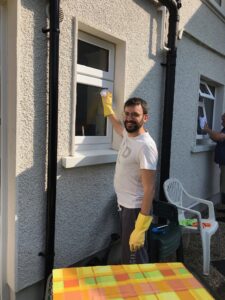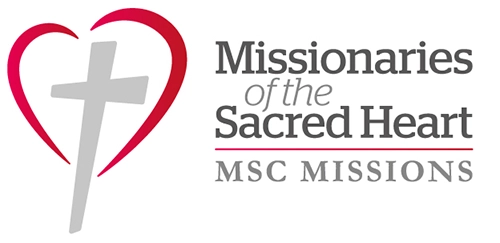Formation
In the first chapter of the prophet Jeremiah we read: “before I formed you in the womb I knew you” (Jer. 1:5.). And later in the same book: “as the clay is in the potter’s hand, so you are in mine.” (Jer. 18:7)
We can see from Jeremiah that God has been shaping and forming all of humanity through their lives. When we look back over our own life story we can see how we have been formed through all the events, relationships, encounters, and circumstances of our story. These have and continue to form the people we are today.
Religious formation is a continuation of this work which God has already begun. It is perhaps more intentional in that we seek to consciously cooperate with God in the work of our growth as human beings and children of God. Religious formation is a lifelong process that we can divide into two categories, initial and ongoing. For us as MSC, initial formation is that journey from the moment a candidate enters our formation house in Dublin to the moment they make their final commitment to our way of life as a religious.
What is Initial Formation?
Our programme of initial formation is divided into three categories which we call:
- Pre-Novitiate
- Novitiate
- Post-Novitiate
Pre-Novitiate
This first stage is a preparation for the novitiate and lasts two years. It is a time of transition from the world outside to the inner world of religious life. It is a time to get used to the change and for reflection and study and a time of deepening your understanding of God’s call. The pre-novitiate focuses on:
- introducing candidates to the practice of personal and communal prayer. There are talks on aspects of the spiritual life and candidates are encouraged to have a personal spiritual director to help deepen their inner life of personal prayer and meditation
- With the help of the formation, team candidates develop deeper self-awareness and self-knowledge as part of the process of learning to live in a community and work as part of a group.
- Pursuing academic studies particularly in the area of philosophy
- Introducing the candidate to our charism, spirituality, the vision of the Founder and to an understanding of our three vows (poverty, celibacy, and obedience) so they can make a sincere and discerned choice to become a vowed member. At this point, candidates take their vows for one year which will be renewed annually until they reach a point when they feel ready to take these vows for life.
At the end of the pre-novitiate, the candidate moves to a more intense stage of spiritual discernment known as the novitiate.
Novitiate
This intense period of spiritual and emotional maturation normally lasts 12 months. During this time novices (as they are called) will focus on developing a deeper understanding of religious life, community living, our charism, and spirituality, the life of the Founder, Jules Chevalier, our three vows, what it means to be a missionary religious, prayer (personal and communal) and self-awareness.
By the end of this intense year of reflection, prayer and personal development novices will have gained a stronger appreciation of our way of life and whether this is where God is calling them to be. You can never be absolutely sure you have been called to religious life if this is truly what God wants for you however, the aim of the novitiate is to provide an intense period of discernment so that you can make as informed a decision as possible. And it’s not unusual for novices to choose not to continue their formation at this point. And for those who leave they do so knowing that the time they have spent in formation has been a valuable and life-changing experience that will support them as they continue on their journey to know what God desires of them. However, those who complete the novitiate now take their first (temporary) vows of poverty, celibacy, and obedience. They will annually renew these vows for the next four to five years.
Post-Novitiate
Once the novitiate is over our candidates or students enter into the next phase of their preparation to become full members of our MSC family. And this phase of their formation lasts

Some members of our formation community gather to share a celebratory meal. Left to right: Jaime Rosique MSC (final year student); Diarmuid O’Murchu MSC; Con O’Connell MSC (a member of Vocations Team); Giacomo Gelardi MSC (final year student)
from four to six years depending on the area of Christian ministry an individual is being prepared to engage in. For example, if a student, with the encouragement and support of his formators, may find they are being called to become ordained. If so, this student would then follow a three-year course in Theology, followed by a pastoral year, ideally on one of our overseas missions before completely training for ordination. Whereas if a student felt called to fulfill their vocation as a bother they might find that they are asked to undertake specialised training in the social sciences, education, or some other pastoral field. Traditionally we have always maintained a broad variety of ministries with the understanding that whatever we do we endeavour to be the human heart of God in these ministries.
While this stage focuses strongly on preparing for one’s future ministry it is also a time of deepening one’s sense of being on the path God desires me to.walk. There are many milestones and moments of celebration on this journey of initial formation. The most significant is the moment when a student decides to give the rest of his life to God by publicly committing the rest of his life to serve as a Missionary of the Sacred Heart. This is a time of great joy and celebration as they take their solemn vows for life. This moment or in the case of those called to the priesthood, ordination marks the end of this initial period of formation. However, the process of formation doesn’t end here. Like life, we never stop being formed and we always need to be open to learning new skills and continuing the quest to deeper our experience of God. So as religious, we commit ourselves to a process of life-long learning called on-going formation. This can take many shapes and depends on the ministry skills and needs of individual brothers.
My Experience of Formation – a reflection
We have reached another landmark on the way towards Solemn Vows. Last May (2020), I finally completed the required theological studies, which followed the philosophical ones. It has been a very busy three years in the formation house, during which I was mainly occupied with the academic part of the formation. But formation is not only about studying (thank God!). Weeks passed by quickly with pastoral placements, human and spiritual formation, and, of course, with community life and prayer. Studies have been tough at times, but I loved studying theology. I really did. To be honest though, if it wasn’t for that day a week that I was meeting people out in the community, sharing life with them, the studies would have been much harder. We are called to be with people and each person we meet brings us life as much as we desire to bring life (hopefully we do) to them. Even in the most difficult situations, it is real life.
Community is a huge support as well. Much more than one imagines. The chance we h

Giacomo renews his vows. Present left to right: Carl Tranter MSC (Provincial Superior ), Alan Whelan MSC (Chaplaincy, Princethorpe College, Rugby, UK); Giacomo Gelardi MSC; Joe McGee MSC (Formation Director Dublin).
ave to share with one another every day, to unload our burdens small or big they might be, is invaluable. My brothers have always been here for me. Anytime really. ‘We are in this together’, we read it often in these covid times… in our community, I found that we really are in this together, in this life with our lives. “Bear one another’s burdens, and in this way, you will fulfill the law of Christ,” said Paul to the Galatians (Gal 6:2). Well, we try and I think we are quite good at it. Of course, life in our community isn’t perfect…well, what family is?
Sometimes I look back at when I first arrived here in Dublin five years ago. I was 34 at that time and I thought I was a man, but all I can see is a toddler of myself. Now I see how much I grew, or should I say how much work God did in me and with me through all
the experiences I lived. Now I look at the future with hope.
Surely I know the plans I have for you, says the Lord, plans for your welfare and not for harm, to give you a future with hope. Then when you call upon me and come and pray to me, I will hear you. When you search for me, you will find me; if you seek me with all your heart, I will let you find me, says the Lord. (Jer 29:11-14)
I look with excitement to what he has in mind for me. How God will continue to form and transform me, God is the only one to really know it. We try to have a guess, but the most important thing I am learning is to let God do his work and trying not to be an obstacle to him. Not easy I can assure you. But ‘piano piano’ ( translated from Giacomo’s native Italian, this means ‘slowly’) I learn to let go of the control over my life. ‘Piano piano’ I, learn to trust God. One day at a time. Giacomo Gelardi MSC

Formation isn’t just about study. Giacomo
Giacomo completed his theological studies in May 2020 and very soon will travel to Fiji where he will complete his pastoral placement year before returning to Dublin in the autumn of 2021. We wish him well as he undertakes this exciting new step on his journey as a Missionary of the Sacred Heart.
